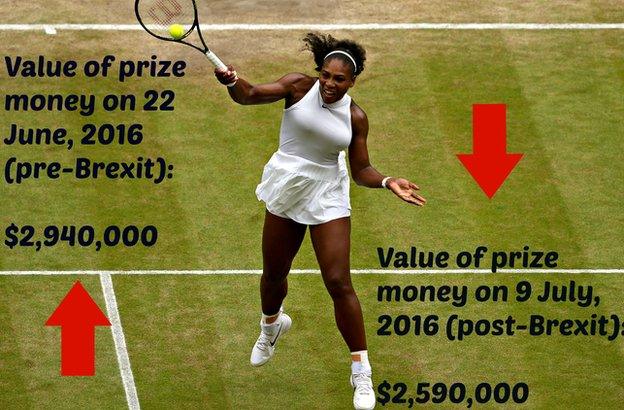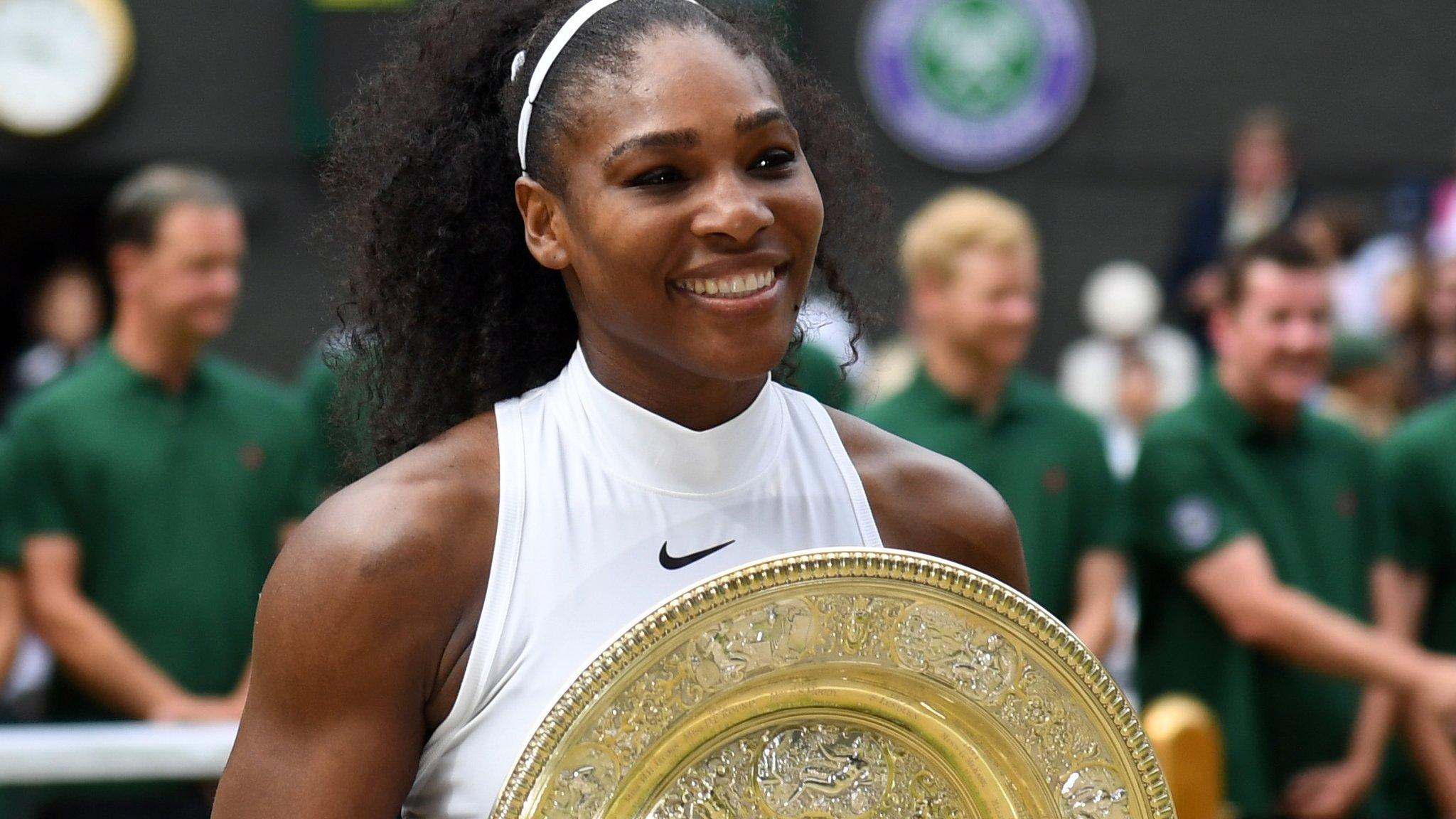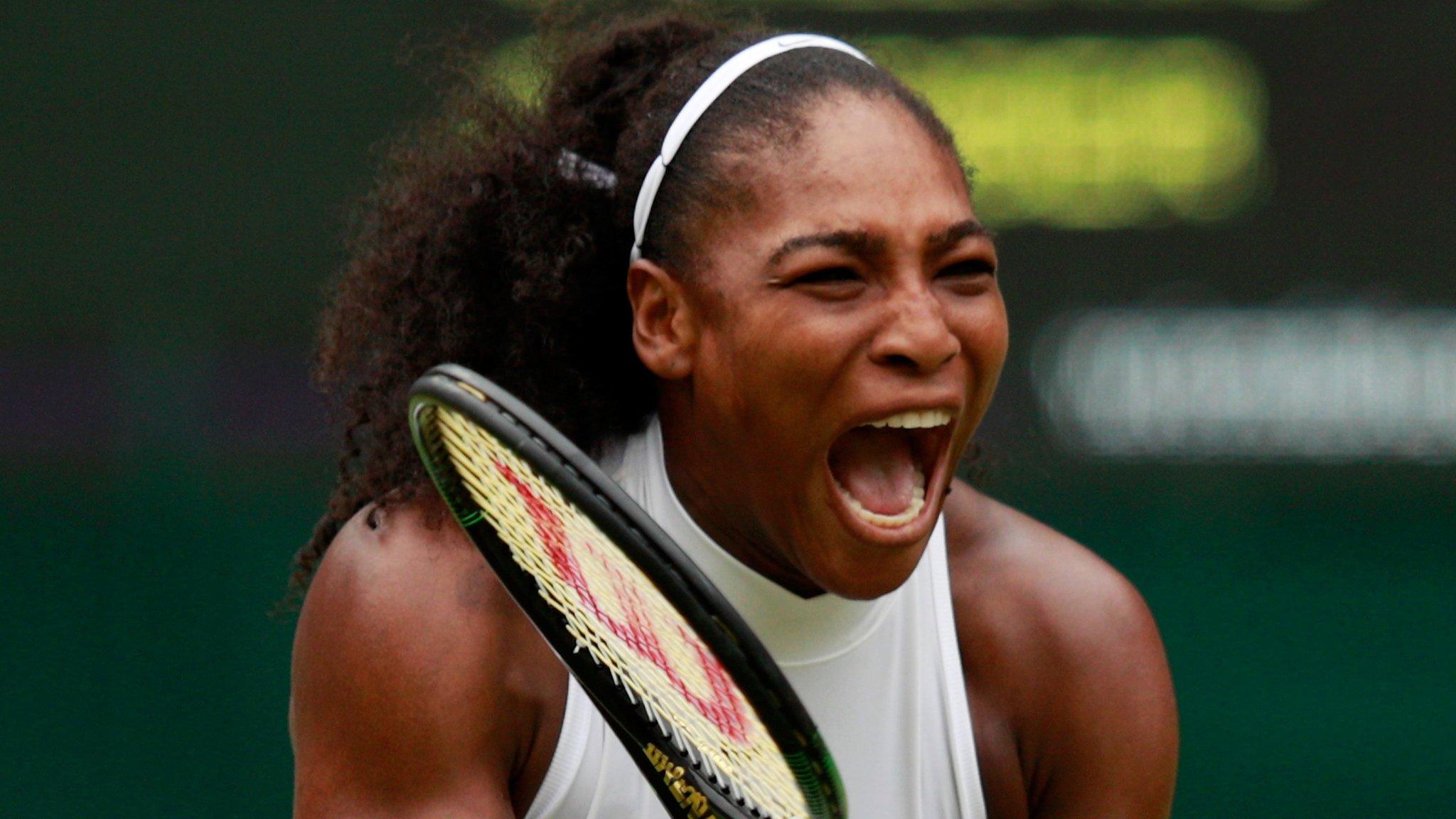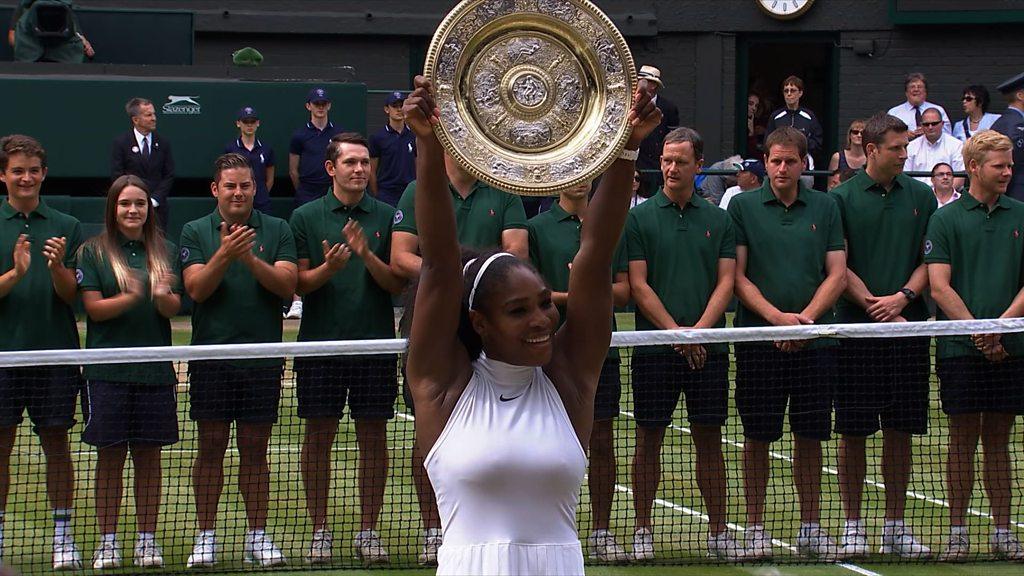Wimbledon 2016: 'Serena Williams should be savoured'
- Published
Wimbledon 2016: Serena takes seventh Wimbledon title
A seventh Wimbledon singles title for Serena Williams, a straight-set victory, a 22nd Grand Slam singles title. So familiar a plot it is, in such a habitual setting, there might be a temptation to shrug as well as applaud. Tales of the expected, the status quo maintained.
Never take it for granted. Never fail to find wonder. Never lose the thrill.
On Friday afternoon, Roger Federer - probably the greatest male player of all time, certainly the most loved - not only found himself beaten by a man with none of his Grand Slam titles and only a little of his all-court game, but confronted with the cruel reality of an ageing body and a sport that is moving on.
He was born within a month of Williams. In the last five and a half years, he has won one Slam. She has won 10. Even as Federer fades, even with a golden glow, Williams dances on.
Saturday's 7-5 6-3 victory over Angelique Kerber, external was never close to a procession. As a contest it was probably the best Wimbledon ladies' final since Venus Williams beat Lindsay Davenport 4-6 7-6 9-7 - 11 long summers ago.
Even in your 28th Grand Slam singles final there are nerves. Williams had lost her previous two, one to Kerber, having been beaten only four times in the preceding 25.
The burden of chasing down Steffi Graf's Open-era record of 22 Slam singles titles appeared to be weighing heavily on her shoulders. With her 35th birthday coming round in September, she is already five years older than Graf when the German headed into retirement.
The moment Serena won her seventh Wimbledon
Kerber knew the template from her triumph at the Australian Open in January. On the opening point of the match, off Williams' serve, she appeared ready to put it to use again - moving the great champion from side to side, hitting short, angled forehands, working the space, hitting the lines.
In the second point came her unsolvable problem: Williams sizzling a backhand right into the guts of the baseline, power and placement coming together in a way that no other female player in history has matched.
After 40 minutes they were locked together at 5-5. Williams had made three times as many unforced errors as her opponent. Kerber had done almost nothing wrong.
In that 11th game, as so often with Williams at the key point in big matches, the gap that has been there for so much of the past decade and a half opened up again.
Kerber, under immense duress, went marginally wide with two forehands. Williams, pouncing, hit a brilliant cross-court backhand that both sealed the break of serve and summed up in a single shot her on-court genius - not just strength, but choice of shot, its execution, its accuracy.
In losing to Milos Raonic in five sets, Federer had double-faulted on successive points to hand away a critical break. Williams' serve, her single greatest weapon, slams doors shut rather than leaving them ajar.
Serena's 65mph serve followed by a 121mph serve
In that first set she hit eight aces to Kerber's none. She won 88% of first serve points. There were also 25 clean winners off her groundstrokes, shock and awe in an uneven war.
Kerber's first break point didn't come until 3-3 in the second set, and even then mainly because the strong wind gusting around Centre played havoc with Williams' ball toss. Williams responded with an ace out wide at 117mph, and followed it up with another down the middle at 124mph.
Because this is Williams, because she understands these finals like no-one else still playing, she pulled Kerber's serve to pieces in the very next game. Returns to the toes, groundstrokes puffing the pummelled lines.
The fall in the value of sterling following the political upheaval in Britain since American Williams arrived just over a fortnight ago means her victory is worth hundreds of thousands of dollars less than it was before she left home.
She remains the gold standard nonetheless. Even the fact that Kerber's progress to the final makes the German the new world number two has the effect of burnishing Williams' brilliance - it is now 20 times the name in that slot has changed since Williams went back to number one in February 2013.
There were 12 years between Graf's first Grand Slam win and her last. Williams is now at 17 years and climbing, already the oldest player - male or female - to be world number one, just one more Slam away from moving statistically clear of Graf, if mere numbers could sum up such players.
We should appreciate every moment from her while we can.
Williams has now won 86 matches at Wimbledon, just one more than Federer. At some stage in the next few years, maybe even as soon as next summer, she will wave goodbye to the arena that has become her court; before then, her reflexes and intensity will start to leach away, just as Federer's have, and her supremacy with it.

* Estimated via an online exchange rate tracker on 9 July, 2016
Do not be fooled either into thinking Serena has only been cashing in on a physical inheritance other players do not have.
As Billie Jean King said in the aftermath of this win, there are great athletes everywhere you look. What nature cannot bequeath is the desire to keep going, the guts to fight through the dark moments, the refusal to be beaten even when excuses acceptable to others are all around.
"I was never the one that was supposed to be good," she has said of her relationship with sister Venus. "But I was determined not to be a statistic."
Now is the time to cherish what she has brought to the sport. Now is the time to give thanks to have seen such a peerless athlete performing at such an untouchable level.
This tournament has been going for so many years there is no longer room on the Venus Rosewater dish for another year's champion's name. Serena Williams is thus the first to be added to a new hardwood plinth that will now cradle the famous old trophy through its next century of superstars.
Last name on the old, first name on the new. Nothing could be more fitting, not for this athlete who straddles eras, not for this champion going where no-one else has gone.
Wimbledon 2016: Serena Williams wins point after 21-shot rally
- Published9 July 2016

- Published9 July 2016

- Published9 July 2016

- Published9 July 2016

- Published9 July 2016
